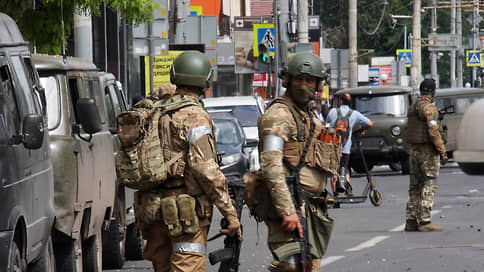FOM and VTsIOM did not note the special impact of Prigozhin’s rebellion on the rating of power
[ad_1]

According to regular polls by FOM and VTsIOM, the rebellion of Yevgeny Prigozhin and the Wagner PMC, although it was noticed by the Russians, had little effect on their attitude to power. Although the pollsters show slight negative fluctuations in the president’s trust and approval ratings, they barely exceed the statistical error. Experts believe that for the most part, Russians did not see any threat to themselves in the ongoing events and perceived them as an action-packed series that did not affect their everyday life.
The rebellion of Yevgeny Prigozhin and Wagner PMC came out on top in the rating of the Public Opinion Foundation of the most important events of the week, according to Russians. As such, 49% of respondents consider him to be such, according to a survey published on July 7. In second place with a score of 14% is Russia’s special military operation in Ukraine. Recall that the polster publishes the results of its measurements taken on the previous Friday and weekend. That is, this survey was conducted from June 30 to July 2. Recall that the main events around the rebellion of PMC “Wagner” took place from 23 to 24 June.
“On the 23rd–24th, Yevgeny Prigozhin wanted to overthrow the government,” “they were worried about Putin because of the military Prigozhin’s attack on Moscow,” sociologists cite the answers of respondents. It should be noted that according to the results of the previous survey conducted on June 23-25 (that is, during the days of the rebellion), the events around the Wagner PMC were only in second place in the list of the most significant events of the week. Then only 19% named them as such, and the special operation was in first place with a result of 30%. That is, the majority of Russians attached significance to the events that took place after the fact.
Apparently, the performance of Wagner PMC, although it affected the ratings of the authorities, was not dramatic. The changes practically do not exceed the error of 3.6% declared by sociologists. Thus, in the week preceding the mutiny (the survey was conducted from June 16 to 18), 79% of Russians positively assessed the work of Vladimir Putin, 78% on the days of the events, and 76% in the week after them. During the days of the rebellion, confidence in Vladimir Putin dropped by 3 percentage points: from 78% to 75%, but at the end of last week it was 76%. Trust in the government immediately after the riot dropped from 57% to 55% and remains at the same level. Respondents give similar assessments to the work of Prime Minister Mikhail Mishustin: over the past two weeks, 57% of Russians positively assessed it, before that – 59%.
Most of all, according to the FOM, the United Russia rating suffered. So, according to the results of the survey from June 16 to 18, it was 46%, and over the past two weeks it has dropped to 41%.
The dissatisfaction of Russians with the authorities has also grown slightly. If in the week before the mutiny, 67% of respondents claimed that they had never heard criticism of the authorities from their entourage, now they are 61%. The number of those who heard such discontent increased from 31% to 37%. Polster did not even register an increase in Russian anxiety. Now it is 45%, the fluctuations of this indicator for two weeks of polls did not exceed one percent. We also note that even in cases where the indicators of power have declined, the values are not extraordinary: similar figures have already been met in the measurements of recent months, and they exceed the estimates of the Russian authorities by respondents before the special military operation.
Similar fluctuations are shown by VTsIOM. Recall that, unlike the FOM, they make their measurements based on the results of the full week preceding the publication of the survey. Polster positions that his statistical error does not exceed one percent. From June 12 to June 18, 76.1% of Russians approved of the president’s activities, 74.8% a week later, and 74.7% a week later. Trust in him has not actually changed: two measurements ago it was 78.9%, now it is 78.1%. According to VTsIOM polls, United Russia’s rating has remained virtually unchanged – now it stands at 39%.
On the one hand, part of the population did not see a threat directly to themselves in this rebellion, on the other hand, a significant part of the respondents remained, rather, grateful to the authorities for the quick and almost bloodless stopping of this rebellion, says political scientist Vladimir Shemyakin. He also finds it interesting that the FOM study, which was actually conducted during the days of the riot, showed a decrease of 3-4% in the number of respondents who noted an increase in prices for almost all positions, and after a week these figures generally recovered. “The mutiny briefly shifted the focus of attention. In my opinion, the logic “if only there was no war” worked once again,” Mr. Shemyakin believes.
Political scientist Alexander Nemtsev, in turn, notes that the rebellion of Yevgeny Prigozhin actually remained an “action-packed series” that never showed up in reality. “It did not affect the daily life of most citizens. Yes, thriller, yes, action-packed. But it quickly ended and did not affect anything, ”says the expert. At the same time, according to Mr. Nemtsev, the rebellion did not go unnoticed by the expert community and the political establishment. “It was a test of the system, and he exposed her thin necks. I think it’s worth waiting for work on the mistakes, ”the political scientist believes.
[ad_2]
Source link








